[ad_1]
Meta is fighting the FTC about the WhatsApp and Instagram acquisition, and it has hit the agency with a preemptive strike. While the FTC claims this is a monopolistic business practice, Meta is going after the legal definitions.
The Federal Trade Commission is currently engaged in a legal battle with Meta. The company, previously known as Facebook, is accused of being anti-competitive and creating a monopoly. Meta has essentially requested a Federal Court to junk the FTC’s antitrust lawsuit.
The Instagram and WhatsApp acquisition benefited consumers, claims Meta
Meta has confirmed it has filed a motion for summary judgment in its lawsuit against the US FTC. The company is essentially asking the District Court to dismiss the case because the “FTC has failed to provide evidence to support its claims.”
There are two aspects that Meta urges the court to consider. The company believes the FTC won’t be able to prove what it claims is the relevant market in the case. In simpler terms, Meta insists that it did not become a monopoly after acquiring Instagram and WhatsApp.
On the contrary, “Meta faces fierce competition from a range of platforms – from TikTok and X to YouTube and Snapchat,” laments the company.
Consumer Watchdog Group Supports Meta’s Move for Summary Judgment in Antitrust Case
WASHINGTON, D.C. – Facebook parent company Meta is moving for summary judgment in the Federal Trade Commission’s (FTC) ongoing litigation against them regarding their acquisition of Instagram and…
— Taxpayers Protection Alliance (@Protectaxpayers) April 5, 2024
Secondly, Meta insists that acquiring WhatsApp and Instagram did not hurt the market or adversely affect end consumers. The company stresses that it has painstakingly improved these social media platforms.
Meta has reportedly stated that it spent “billions of dollars” and invested “millions of hours” to make the apps, “better, more reliable, and more secure.”
Why is Meta urging the US Court to dismiss its case against the FTC?
Meta insists the FTC has no evidence establishing that the company’s conduct was “exclusionary”. What this essentially means is that Meta claims acquiring Instagram and WhatsApp did not cause harm to its competitors and consumers. In other words, Meta has implied that its actions weren’t detrimental to the competition, and they didn’t negatively affect end users.
It is important to note that back in 2021, DC District Court Judge James Boasberg had accepted Meta’s motion to dismiss FTC’s complaint. However, the judge gave the FTC a chance to file an amended one, which was allowed to move forward.
NetChoice Applauds Meta For New Motion to Halt Biden FTC’s Anti-Consumer Agenda
WASHINGTON—Today, Meta filed a motion at the U.S. District Court for the District of Columbia, pushing back against the Federal Trade Commission for its lack of evidence in its case against the… pic.twitter.com/xVUvsgdRgV
— NetChoice (@NetChoice) April 5, 2024
The FTC’s amended complaint is far more substantial and detailed than its previous one. However, in its appeal, Meta has targeted the FTC’s market definitions, which it claims are “unreasonably narrow”.
The FTC has excluded platforms such as TikTok and YouTube from its market definitions. Instead, in its complaint, the agency includes only Facebook, Instagram, Snapchat, and MeWe, Meta claims.
Needless to say, Meta’s platforms are way bigger than the other platforms included in the FTC’s market definitions. However, if other big web platforms and companies are included, Meta’s gargantuan stature is somewhat humbled.
The FTC will get a chance to respond. Hence, there should be a lot of back-and-forth in court filings.
[ad_2]
Source link
